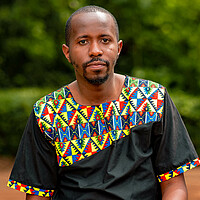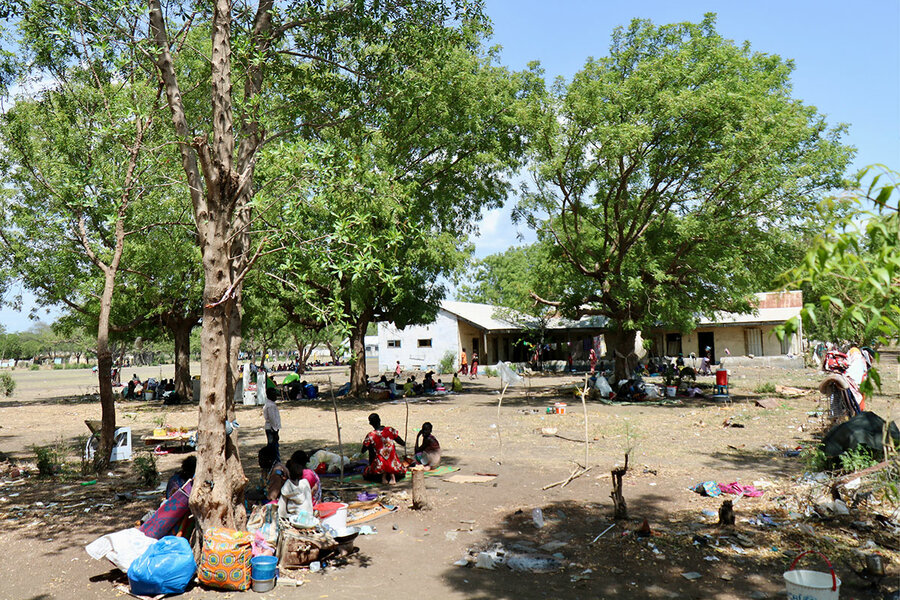In South Sudan’s refugee camps, resilience and compassion
Loading...
| MALAKAL, SOUTH SUDAN
Ezekiel Akwach touches the sick boy’s forehead and jots down a note in his notebook.
“He’ll be fine. We’re working to make sure they get help immediately,” he tells the boy’s worried family.
Why We Wrote This
A story focused onAs conflict threatens to derail Sudan and the region – already triggering a stream of refugees to neighboring countries burdened with their own crises – ordinary citizens have resolved to step in and support each other.
Many in this sprawling refugee camp in Malakal, including Mr. Akwach, are returnees. Having fled north to Sudan from South Sudan when a civil war erupted in 2013, they are now returning home after fighting broke out between rival factions of Sudan’s military government in April.
Despite the grim situation, many South Sudanese have resolved to care for each other.
Amid manpower shortages, Mr. Akwach, who abandoned his retail business in Sudan, volunteered to help collect data – work that makes him part therapist, part caregiver. Elsewhere, a local resident funded a barge trip to bring returnees to the city; another is building eight toilets at the camp.
Mr. Akwach hopes to eventually get a job and bring his family over. But first, he’ll repay a friend who lent him 50,000 South Sudanese pounds, about $80, to get to Malakal. He’ll double the amount, he says.
“When someone helps you, you do something good for him,” he says.
Ezekiel Akwach crouches down on a gray blanket spread under a tree, joining a large group of people gathered around a little boy lying on the ground, writhing from side to side and holding his head in his hands.
Mr. Akwach touches the boy’s forehead with the back of his hand and jots down a note in his notebook.
“I’m recording information about children who need medical assistance,” he tells the family. “He’ll be fine. We’re working to make sure they get help immediately.”
Why We Wrote This
A story focused onAs conflict threatens to derail Sudan and the region – already triggering a stream of refugees to neighboring countries burdened with their own crises – ordinary citizens have resolved to step in and support each other.
“Please,” the child’s aunt responds, clasping her hands.
Mr. Akwach nods, then springs up and gazes around for his next stop in the sprawling refugee camp in Malakal, South Sudan’s second-largest city. Many here, including Mr. Akwach, are returnees. Having fled north to Sudan from South Sudan when a civil war erupted in 2013, they are now returning home after fighting broke out between rival factions of Sudan’s military government in April.
Mr. Akwach’s personal trajectory in some ways gives a glimpse into how the conflict has upended millions of lives. Already, more than 25 million Sudanese – half the population – are in need of humanitarian aid. Sudan also sits at the center of seven other African nations, all grappling with their own internal humanitarian and political crises.
Once a diverse and thriving capital of South Sudan’s oil-rich Upper Nile state, Malakal has now become the main port of call for a stream of refugees and returnees.
Yet despite the grim situation, South Sudanese people have resolved to care for each other.
In Malakal, a local resident funded a barge trip to bring returnees to the city; another is building eight toilets at the camp. Mr. Akwach, who had to abandon his retail business in Sudan, has volunteered to collect data on the refugees and returnees pouring into the camp – work that requires him to be part therapist, part caregiver for long hours of the day.
“They are resilient as they have got used to many crises,” says Sister Elena Balatti, the director of Caritas Malakal, the humanitarian arm of the Catholic Diocese of Malakal, which is also providing relief at the camp. “It is true for so many people.”
Cycles of displacement
As he approached Malakal by barge last month, Mr. Akwach began having flashbacks of his old life.
He remembered how he loved drinking wala-wala, or millet porridge, in the morning and playing soccer with friends after school. But he also recalled the day when gunfire between government and rebel forces drove him and his family from the city where he was raised. Memories of bodies on the ground and people running for their lives still haunt him.
He, his mother, his sister, and her three children left their house with the few belongings they could carry in their hands, and made the three-day journey to Khartoum, Sudan’s capital, by boat and cars.
The family rebuilt their lives there. Mr. Akwach completed high school, graduated from university, started a phone and accessory shop, and got married. No one planned on coming back. But nearly 10 years later, Mr. Akwach felt he was reliving the same nightmare when a conflict once again erupted on his doorstep.
The outbreak of fighting in Sudan is the result of a power struggle between the leaders of the two main factions of the country’s military government: General Abdel Fattah al-Burhan of the Sudan Armed Forces, and General Mohamed Hamdan Dagalo of the Rapid Support Forces (RSF).
The two men played important roles in a 2021 coup that toppled Prime Minister Abdalla Hamdok and was supposed to reform the coalition government he was heading following the ouster of President Omar al-Bashir in a coup in 2019.
But disputes emerged between them during talks to integrate the paramilitary RSF into the regular military. The deadly fighting pushed a million people from their homes, and Mr. Awkwach is among the 30,000 who have fled to South Sudan.
In Malakal, he found a camp in crisis.
The new influx of arrivals piles more humanitarian pressure on a country that already has the world’s largest refugee population. Alongside those displaced during the civil war, another wave of refugees had arrived in the wake of catastrophic flooding in neighboring Jonglei state in 2021.
“Resources were not even enough even to cater for these two categories of people in need,” says Sister Balatti, from Caritas Malaka. “The resources are limited. Resources have been outstretched.”
Resource management
During his daily round at the camp one hot afternoon, Mr. Akwach spots a young girl scaling fish in a cooking pot as an older woman sits nearby, watching over two children. Nyatipo Akuot arrived a few days earlier with her daughter and three granddaughters. One recent afternoon, they lined up together with tens of other people to wait for their turn for food distribution. But in a split second, a scuffle broke out and a few people made off with all the rations.
“It was overwhelming and not organized,” says Ms. Akuot.
Mr. Akwach approached the family and shook each person’s hand. Ms. Akuot says the family has at times gone for days without food but were relieved as relatives had given them money to buy fish. Mr. Akwach reassures them that a new batch of donated food would arrive the next day and that the family would be among the recipients.
Still, not every encounter is so hopeful. Early in June, tensions began to rise after women tussled at a water point. Then, last week, at least 20 people died when clashes broke out after a man was stabbed. Malakal, like several other camps, is home to ethnic groups and communities who maintain an uneasy peace following the civil war that ended in 2018. The United Nations office in South Sudan said it had reinforced the military and police presence.
Nearly 10,000 people arrived at the camp during its first two weeks of operation, and while most have left for other parts of the city and the country, aid workers are expecting more to come.
“Across the country ... we have only been able to provide two weeks’ worth of food to families each month,” says Gemma Snowdon, head of communications for the World Food Programme in South Sudan. “This operation is putting pressure on limited resources as WFP is redirecting food to assist new arrivals.”
There’s also a shortage of human capital. For thousands of refugees and returnees, the government has a team of just 14 people on site to oversee camp activities. Shortly after Mr. Akwach arrived, officials formed a team of 27 returnees tasked with collecting data and being a point of contact for new arrivals who may have questions. The work doesn’t come with pay, but the volunteers get occasional meals, and Mr. Akwach was recently voted chairman of the team.
Mr. Akwach’s goal is to get a job with a nonprofit and so he can rent a house and bring his family over.
“I myself am sleeping on the ground near the river,” he says. “This situation is not suitable for them.”
He acknowledges that getting a job may take a while as the city is still rebuilding itself and there are few opportunities. In the meantime, volunteer work at the camp will suffice.
But first, he’ll have to repay a debt to a friend who lent him 50,000 South Sudanese pounds ($83) to help him get to Malakal. He’ll double the amount, he says.
“Two times, not one. When someone helps you, you do something good for him,” he says.









